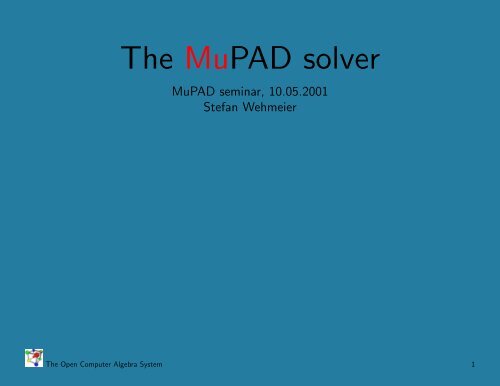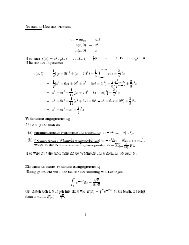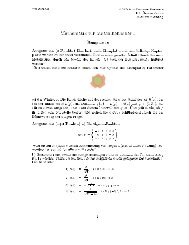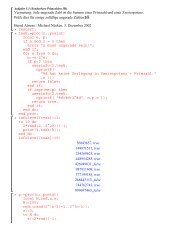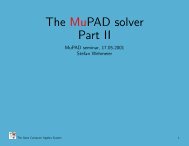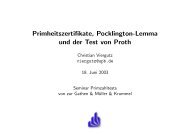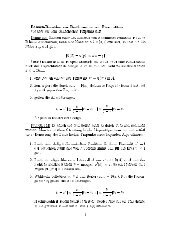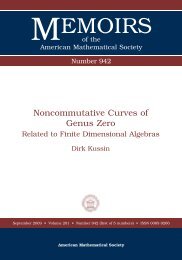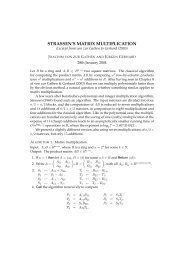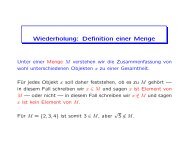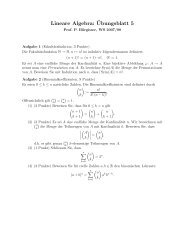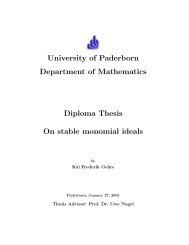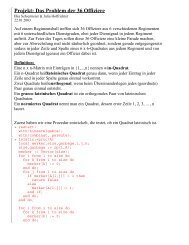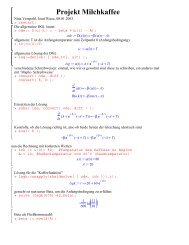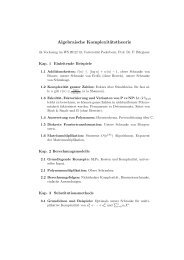Create successful ePaper yourself
Turn your PDF publications into a flip-book with our unique Google optimized e-Paper software.
<strong>The</strong> <strong>MuPAD</strong> <strong>solver</strong><br />
<strong>MuPAD</strong> seminar, 10.05.2001<br />
Stefan Wehmeier<br />
<strong>The</strong> Open Computer Algebra System 1
Goal of the <strong>solver</strong><br />
Given: a statement φ(x 1 , . . . , x n , y 1 , . . . , y k ) and some variables x 1 , . . . , x n .<br />
To find: the set S(y 1 , . . . y k ) ⊆ C n such that<br />
φ(c 1 , . . . , c n , y 1 , . . . , y k ) ⇔ (c 1 , . . . , c n ) ∈ S(y 1 , . . . , y k ).<br />
But: this is too hard!<br />
<strong>The</strong> Open Computer Algebra System 2
Calls to solve not subject of this talk<br />
<strong>The</strong> <strong>solver</strong>, in a narrower sense, does not contain:<br />
• numerical solving<br />
• solving differential equations<br />
• solving recurrence equations<br />
Remark:<br />
Floats in the coefficients do not cause the numerical <strong>solver</strong> to be<br />
called.<br />
<strong>The</strong> Open Computer Algebra System 3
Structure of the <strong>solver</strong><br />
We distinguish the following types of problems<br />
• solving one equation for one variable<br />
✓<br />
>> solve(x^2=9, x)<br />
✏<br />
✒<br />
{-3, 3}<br />
✑<br />
• solving a system of equations or solving for several variables<br />
<strong>The</strong> Open Computer Algebra System 4
✓<br />
>> solve({x^2+y=2, x+3*y=5})<br />
✏<br />
{ -- 1/2 1/2 --<br />
{ | 13 13 |<br />
{ | x = 1/6 - -----, y = ----- + 29/18 |,<br />
{ -- 6 18 --<br />
✒<br />
-- 1/2 1/2 -- }<br />
| 13 13 | }<br />
| x = ----- + 1/6, y = 29/18 - ----- | }<br />
-- 6 18 -- }<br />
✑<br />
• solving inequalities<br />
✓<br />
>> solve(x^2 < 4, x)<br />
✏<br />
✒<br />
]-2, 2[<br />
✑<br />
• finding all values of x such that f(x) belongs to a specified set<br />
<strong>The</strong> Open Computer Algebra System 5
✓<br />
>> solve(x^2 in Dom::Interval(3, 5), x)<br />
✏<br />
✒<br />
]3^(1/2), 5^(1/2)[ union ]-5^(1/2), -3^(1/2)[<br />
✑<br />
and some options that invoke special methods.<br />
<strong>The</strong> Open Computer Algebra System 6
<strong>The</strong> equation <strong>solver</strong><br />
Called if:<br />
the first argument is an equation, polynomial, or an expression,<br />
and the second argument is an identifier or indexed identifier<br />
Returns:<br />
the set of all zeroes of the expression/ all solutions of the equation<br />
that are compatible with the properties of the variable to solve for<br />
Related: the <strong>MuPAD</strong> concept for sets. I will not talk about this today.<br />
<strong>The</strong> Open Computer Algebra System 7
Algorithms to solve equations<br />
<strong>MuPAD</strong> tries, one after another, subroutines that<br />
• handle products as well as powers with constant exponent<br />
• check whether the input is a polynomial; if yes, use the polynomial <strong>solver</strong><br />
• handle equations f(A(x)) = C for certain special functions f and expressions<br />
A(x)<br />
• rewrite the input in terms of a piecewise defined object<br />
• handle Re and Im<br />
• rewrite equations by (algebraic) systems<br />
<strong>The</strong> Open Computer Algebra System 8
• rewrite/simplify the expression and start over the whole algorithm<br />
If nothing helps, an unevaluated call to solve is returned.<br />
In any case, the equation is solved over C first; compatibility with the properties of<br />
the variable is checked at the end.<br />
To do:<br />
Work out better methods for solving over the reals.<br />
<strong>The</strong> Open Computer Algebra System 9
Special cases for products and powers<br />
• <strong>The</strong> zeroes of a product are those zeroes of its factors where every factor is<br />
defined.<br />
• <strong>The</strong> zeroes of f(x) a are the zeroes of f(x) unless a is negative<br />
• f(x) n = a may be handled by solving y n = a and then f(x) = y.<br />
If none of these cases matches, the input is expanded.<br />
It is important to try those special cases before expanding:<br />
<strong>The</strong> Open Computer Algebra System 10
✓<br />
>> simplify(solve((x+3)^5=32, x))<br />
✏<br />
{ 1/2<br />
{ 5 1/2 1/2<br />
{ -1, - ---- - 1/2 I (10 - 2 5 ) - 7/2,<br />
{ 2<br />
1/2<br />
1/2 1/2 5<br />
1/2 I (10 - 2 5 ) - ---- - 7/2,<br />
2<br />
1/2<br />
5 1/2 1/2<br />
---- - 1/2 I (2 5 + 10) - 7/2,<br />
2<br />
✒<br />
1/2 }<br />
5 1/2 1/2 }<br />
---- + 1/2 I (2 5 + 10) - 7/2 }<br />
2 }<br />
✑<br />
<strong>The</strong> Open Computer Algebra System 11
<strong>The</strong> polynomial <strong>solver</strong><br />
<strong>The</strong> zeroes of a polynomial are the zeroes of its irreducible factors. Each factor<br />
f(x) is solved as follows:<br />
• decomposition: try to write f(x) = g(h(x)), then solve g(y) = 0 and h(x) = y<br />
• use a special formula for roots of unity if f(x) is of the form x n + a.<br />
• use explicit formulas for degrees ≤ 4. (Thanks to Walter, these formulas are<br />
now numerically stable for floating point coefficients.<br />
If none of these merthods work, the result is a RootOf - expression.<br />
Remark:<br />
<strong>The</strong> option MaxDegree=n may be used to switch off Cardano<br />
formulas for degrees > n.<br />
<strong>The</strong> Open Computer Algebra System 12
To do:<br />
If f is a composition of polynomials with parameters in the leading<br />
coefficients, polylib::decompose cannot detect this. Piecewise<br />
defined solutions for the components still need to be handled.<br />
<strong>The</strong> Open Computer Algebra System 13
Handling of special functions<br />
Let f be a special function. An equation f(g(x)) = C is solved by solving f(y) = C<br />
and g(x) = y.<br />
This is done by case analysis on f, inside the method solvelib::isolate.<br />
Remark:<br />
A function environment f may have an isolate attribute to<br />
overload this part of the <strong>solver</strong>.<br />
Remark:<br />
I have no idea how to handle special functions with more than<br />
one argument yet. However, there are special methods for plus,<br />
mult, and power.<br />
<strong>The</strong> Open Computer Algebra System 14
✓<br />
>> solve(exp(x^2)=1, x)<br />
✏<br />
{ (2*I*PI*X87)^(1/2) | X87 in Z_ } union<br />
{ -(2*I*PI*X89)^(1/2) | X89 in Z_ }<br />
>> solve(exp(x^2)=1, x)<br />
{ (2*I*PI*X87)^(1/2) | X87 in Z_ } union<br />
{ -(2*I*PI*X89)^(1/2) | X89 in Z_ }<br />
>> solve(exp(y)=1, y)<br />
>> solve(x^2 in %, x)<br />
{ 2*I*PI*X369 | X369 in Z_ }<br />
{ (2*I*PI*X371)^(1/2) | X371 in Z_ } union<br />
{ -(2*I*PI*X373)^(1/2) | X373 in Z_ }<br />
✒<br />
✑<br />
<strong>The</strong> Open Computer Algebra System 15
Heuristics for sums and powers<br />
• Rewrite f(g(x)) − f(h(x)) = 0 as f(g(x)) = f(h(x)) and apply an inverse<br />
function of f to both sides<br />
• Rewrite f(x) −a = C as f(x) = C a if C ≠ 0.<br />
• Rewrite f(x) p/q = C as f(x) p = C q , and check the solutions in the end.<br />
• Rewrite powers by exp and ln.<br />
<strong>The</strong> Open Computer Algebra System 16
Rewriting functions by piecewise functions<br />
Some particular discontinous functions are replaced by piecewise defined functions:<br />
✓<br />
>> rewrite(abs(x^2) - sign(x), piecewise)<br />
✏<br />
/ 2 2 2<br />
piecewise| x - 1 if 0 < x, x if x = 0, x + 1 if x < 0,<br />
|<br />
\<br />
2 2 x \<br />
Im(x) + Re(x) - -------------------- if not x in R_ |<br />
2 2 1/2 |<br />
(Im(x) + Re(x) ) /<br />
✒<br />
✑<br />
This can be solved branchwise:<br />
<strong>The</strong> Open Computer Algebra System 17
✓<br />
>> solve(abs(x^2) - sign(x) = 1, x)<br />
✏<br />
✒<br />
1/2<br />
{2 }<br />
✑<br />
<strong>The</strong> Open Computer Algebra System 18
How to handle Re and Im<br />
If an equation depends on Re(x) and Im(x), replace the argument x by u + I ∗ v<br />
(u, v real).<br />
✓<br />
>> solve(Im(x^2) - x = 2, x)<br />
✏<br />
{-2}<br />
// Internally, this is done as follows:<br />
>> assume({u, v}, Type::Real):<br />
>> Im((u+I*v)^2) -u-I*v<br />
✒<br />
2 u v - I v - u<br />
Splitting into real- and imaginary part gives a system v = 0, 2uv − u = 2, which<br />
<strong>MuPAD</strong> can solve.<br />
✑<br />
<strong>The</strong> Open Computer Algebra System 19
Rewriting equations as systems<br />
Suppose we have to solve f(x) = 0, where f is non-polynomial.<br />
Idea: construct a tower C(x) = K 0 ⊆ . . . ⊆ K n of simple field extensions<br />
K i = K i−1 (α i ) such that f ∈ K n .<br />
If all extensions are algebraic, we can write down a system consisting of f and the<br />
minimal polynomials of the α i .<br />
<strong>The</strong> Open Computer Algebra System 20
Example:<br />
x 1/2 + (x 2 + 1) 1/2 + x − 5 = 0<br />
becomes<br />
α 1 + α 2 + x − 5 = 0<br />
α 2 1 − x = 0<br />
α 2 2 − x 2 − 1 = 0<br />
<strong>The</strong> system <strong>solver</strong> can do this.<br />
<strong>The</strong> Open Computer Algebra System 21
✓<br />
>> solve({alpha1 + alpha2 + x - 5, alpha1^2 - x,<br />
&> alpha2^2 - x^2 - 1}, [x, alpha1, alpha2])<br />
✏<br />
{ -- 2<br />
{ | 42 alpha2 4 alpha2<br />
{ | x = --------- + --------- + 2/59,<br />
{ -- 59 59<br />
2<br />
4 alpha2 101 alpha2<br />
alpha1 = 293/59 - --------- - ----------,<br />
59 59<br />
✒<br />
-- }<br />
2 3 | }<br />
alpha2 = RootOf(79 X6 - 524 X6 + 4 X6 + 697, X6) | }<br />
-- }<br />
✑<br />
Resubstituting α 2 gives<br />
<strong>The</strong> Open Computer Algebra System 22
✓<br />
>> solve(x^(1/2)+ (x^2+1)^(1/2)+ x= 5, x)<br />
✏<br />
{ 42/59*X7 + 4/59*X7^2 + 2/59 | X7 in RootOf(79*X6^2 - 524*X6\<br />
+ 4*X6^3 + 697, X6) }<br />
✒<br />
✑<br />
Currently, <strong>MuPAD</strong> tries to handle such towers if they are algebraic. <strong>MuPAD</strong> can<br />
also handle the case when f(x) = g(h(x)) and g is algebraic over h(x):<br />
✓<br />
>> solve(sin(x)^(1/2)+ (sin(x)/2 + 1)^(1/2)= 5, x)<br />
✏<br />
{ 2*PI*X33 + arcsin(152 - 40*13^(1/2)) | X33 in Z_ } union<br />
{ 2*PI*X27 + arcsin(40*13^(1/2) + 152) | X27 in Z_ } union<br />
{ PI + 2*PI*X35 - arcsin(152 - 40*13^(1/2)) | X35 in Z_ }<br />
union<br />
✒<br />
{ PI + 2*PI*X29 - arcsin(40*13^(1/2) + 152) | X29 in Z_ }<br />
✑<br />
<strong>The</strong> Open Computer Algebra System 23
NOTE THAT:<br />
Of course, x 1/2 = y is not equivalent to x = y 2 . <strong>The</strong> <strong>solver</strong> can<br />
sometimes single out those solutions with too small polar angle,<br />
and sometimes not.<br />
Remark:<br />
You can skip this step using the option DontRewriteBySystem.<br />
<strong>The</strong> Open Computer Algebra System 24
Very last attempts before giving up<br />
Finally, the <strong>solver</strong> attempts to rewrite the input in equivalent form.<br />
NOTE THAT:<br />
But this may result in a non-equivalent expression, defined for a<br />
different set of values of the variable! But the <strong>solver</strong> takes care<br />
not to output solutions where the expression is not defined.<br />
✓<br />
>> solve(sin(x)^2+cos(x)^2=1, x)<br />
✏<br />
✒<br />
C_ minus { PI + 2*X4*PI | X4 in Z_ }<br />
✑<br />
To do:<br />
Revise our expression manipulation functions.<br />
<strong>The</strong> Open Computer Algebra System 25
Known problems/limitations of the equation <strong>solver</strong><br />
• Algebraic dependencies may be overlooked<br />
• does not know all special functions yet<br />
And: probably many unknown problems/errors due to too few tests.<br />
<strong>The</strong> Open Computer Algebra System 26


